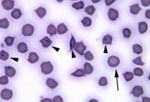File:Lymph node smear East Coast Fever.jpg
Lymph node smear of a cow with East Coast Fever - Drs. Elizabeth Howerth and Bruce LeRoy, Department of Pathology, UGA College of Veterinary Medicine
File:H and E stain brain East Coast Fever.jpg
H and E stain of brain and meningal vessels of a cow with East Coast Fever - Drs. Elizabeth Howerth and Bruce LeRoy, Department of Pathology, UGA College of Veterinary Medicine
- Main species of veterinary importance is Theileria parva
- Causes East Coast Fever
- Severe, proliferative lymphatic disease of cattle
- Central and Eastern Africa
- Transmitted by Rhipicephalus appendiculatus
- Trans-stadial transmission
- Causes East Coast Fever
- Other Theileria species cause production losses in cattle and sheep in the Middle East, Mediterranean and in Northern Africa
Life Cycle
- Incubation phase lasts 1 week
- Lymphoblast proliferation
- Local lymph node first infected then spreads through body
- Occurs in week two
- Lymphoid depletion
- Lymphocytes killed
- Decreases lymphopoiesis
- Occurs in week 3
- Total incubation period takes about 18 days
Diagnosis
- Clinical signs
- Pyrexia
- Enlarged local lymph node
- Usually parotid lymph node as Rhipicephalus appendiculatus feeds in the ear
- Loss of condition
- Examine Giemsa stained smears of:
- Local lymph node aspirated for schizonts
- Blood smears for piroplasms in red blood cells
- Post-mortem
- Pulmonary oedema
- Gut mucosal haemorrhages
- Lymph node and splenic cellular atrophy
Control
- Integrated control of both the tick vector and disease
- Current vaccination is live unattentuated
- Contains frozen stabilate of ground up tick gut containing infective sporozoites
- Long lasting oxytetracycline administered at the same time to slow down schizogony giving the immune response time to develop

